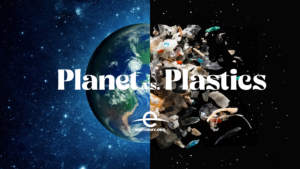This year, the theme of Earth Day is Planet vs. Plastic, so we want to share 10 ways to cut down your plastic usage for a more sustainable future.
In 2020, the world produced over 500 million tonnes of plastic, a staggering 900% increase from 1980, showing the urgent need to reduce plastic usage and embrace practices that lead us closer to achieving net zero carbon footprint. Our seas and oceans, now home to approximately eight million tons of plastic waste annually, paint a grim picture of pollution, urging us to mark every day as Earth Day through concerted action to reduce, reuse, and ensure a sustainable future.
At Jump, we help people to make simple changes and incentivise sustainable behaviour. By focusing on reducing personal plastic consumption rather than just recycling, we empower individuals and organizations to take meaningful steps towards minimizing their carbon footprint. At Jump, we’re on a mission to empower and motivate people for a sustainable future. Join us in championing sustainability by adopting and promoting these 10 simple actions for to live a life of less plastic
Ditch fast fashion
Approximately 69% of clothing is manufactured from plastic-based materials like polyester and nylon, which are not only prone to quick wear and tear but also lead to substantial waste. When discarded, these garments release microplastics and toxic chemicals such as PFAS into our environment, contaminating air, water, and soil.
By shifting towards sustainable fashion brands and embracing the slow fashion movement, consumers can reduce their environmental impact. Opting for garments made from natural or recycled materials not only supports ecological balance but also promotes fair labour practices and reduces carbon emissions.
Wash your clothes less frequently and on cold
Each laundry cycle releases hundreds of thousands of microfibers into the wastewater, primarily from synthetic textiles like polyester. By choosing to wash less often and only when necessary, opting for cold water, and washing full loads during washing can further minimize the release of these tiny plastic particles.
Innovative solutions such as installing microfiber filters in washing machines have shown promise in capturing these fibres before they enter the water systems. Products like the PlanetCare filter are independently proven to stop up to 90% of microfibers from reaching the oceans.
Ditch the wet wipes
Disposable wet wipes, often made from non-biodegradable materials like polyester and polypropylene, contribute significantly to landfill waste and water pollution, with over 300,000 sewer blockages annually due to improper disposal.
For everyday cleaning and hygiene, reusable cloths offer a sustainable alternative. They can be washed and reused multiple times, reducing waste and saving money in the long run.
Buy packaging-free groceries
By opting for bulk purchases, consumers can significantly cut down on the amount of packaging waste, which is a major contributor to landfill accumulation.
Furthermore, shopping at zero waste stores enhances this experience by offering products that are fresh, organic, and free from excessive packaging. These stores typically provide a wide range of unprocessed whole foods and other household items, which also aids personal health by reducing exposure to harmful chemicals.
Shop seasonal and local
By choosing to buy from local farmers and markets, you support community-based agriculture and reduce the environmental impact associated with long-distance food transportation. Locally sourced and seasonal foods also require less transportation, refrigeration, and storage, conserving energy and reducing carbon footprint.
Seasonal foods are fresher and packed with more nutrients compared to those that have travelled long distances and have been stored for long periods. They also promote soil health through crop rotation and reduce the need for chemical fertilizers, further contributing to environmental health.
Use a refillable water bottle
Opting for a refillable water bottle is a simple yet profound step towards sustainability. By making this switch, individuals can significantly reduce their carbon footprint and contribute to the solution against plastic pollution.
Using a stainless-steel water bottle, which can last a lifetime with proper care, can save people approximately $1,236 annually, while also preventing around 156 plastic bottles from entering our oceans each year.
Volunteer for a litter pick
Volunteering for litter picking initiatives, such as the Great British Spring Clean, plays a crucial role in environmental conservation by directly removing waste from natural habitats and urban areas. By participating in these activities, volunteers make a tangible impact, with past events seeing hundreds of thousands of volunteers removing significant amounts of rubbish nationwide.
Organized events like these also serve as powerful educational tools. They highlight the severity of plastic pollution and inspire participants to adopt more sustainable habits, such as reducing single-use plastics in their daily lives. It also provides invaluable data about the amount of waste in the environment – data which can be used to affect corporate and government policy.
Educate yourself
Educating oneself about reducing plastic use is pivotal in fostering sustainable behaviours. Platforms like Everyday Green and Plastic Free July offer a wealth of resources and engage communities globally to minimize plastic waste.
Moreover, educational initiatives by NOAA and other organizations like the Surfrider Foundation and Plastic Pollution Coalition enrich understanding through detailed programmes and materials focused on marine debris and plastic pollution.
Jump motivates sustainable practices, as seen with clients like Bournemouth University and the University of Reading, who have made notable strides in reducing plastic waste. Engaging in Jump programmes not only educates but also empowers communities, aligning with Jump’s mission to drive significant environmental change.
Educate your people
At Jump, we emphasize the transformative power of knowledge in driving behavioural change. By integrating environmental education into your organization, you can significantly amplify the impact of sustainability initiatives.
Organize regular awareness campaigns and workshops that highlight the staggering facts about plastic pollution, such as the millions of plastic bottles purchased every minute worldwide. These sessions can include interactive activities like litter collection days or plastic use audits that make the data relatable and actionable.
Encourage departments to keep detailed records of their initiatives and outcomes. This not only helps in maintaining momentum but also in celebrating the wins, however small, which can significantly boost morale and commitment to the cause.
Sign up for a Jump programme
Last but not least, the best way to reduce plastic consumption for yourself and your organisation is to invest in a Jump programme for your organisation. Our programmes are designed to educate and incentivize employees, encouraging them to adopt more sustainable practices both in and out of the workplace.
Join our webinar
This week, we are hosting a webinar all about educating and engaging your people with sustainability. Guest speaker, Simon Goldsmith, will discuss University of Greenwich’s sustainability strategy, and our very own Katie Rees will be on-hand to give 5 tips for engaging people with sustainability. Sign up here or via the pop-up in the corner of this page.
Book a call
Speak with our team to find out how Jump can help you to educate your people about the impact their everyday actions make and incentivise them to take action for a sustainable future.





